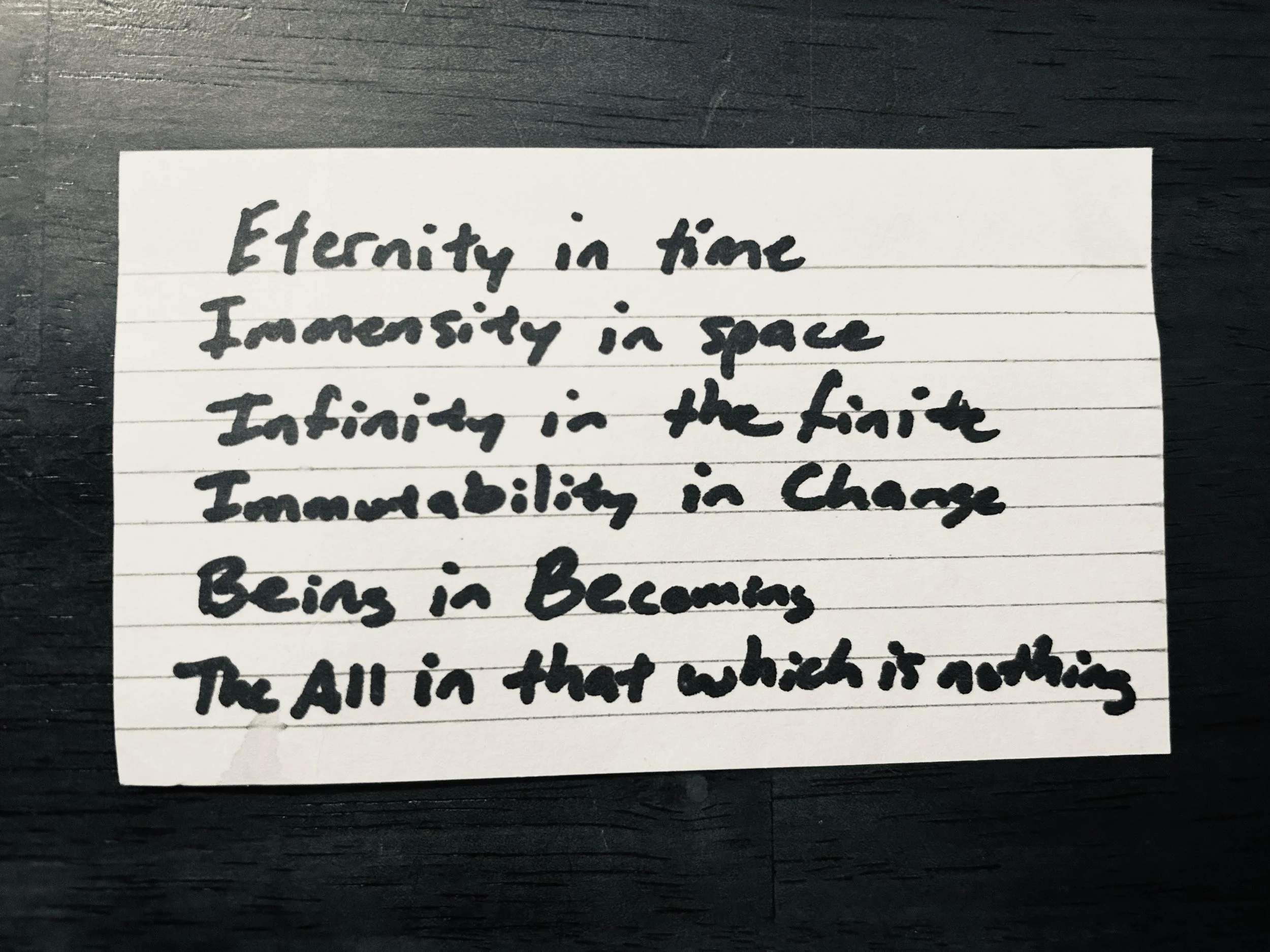The Incomprehensibility of God and His Covenantal Kindness
(Above: In December 2023, I read the quote from Herman Bavinck cited in this article. I wrote the words down on a 3×5 notecard, pictured above, and it has remained on my desk ever since as a reminder of God’s kindness to accommodate His creation.)
Introduction
In October 2021, I explained that Calvinism is a gateway to Covenant Theology. Today, I extend my hand to clasp the grip of those who have crossed the threshold of that gateway into the wonderful world of covenanting. Here, you will find Yahweh relating to Adam, Noah, Abraham, Moses, David, and the entire covenant community. As you look around, please note how the covenant contours throughout Scripture display continuity coalescing in the person and work of Christ, who shed his blood for the New Covenant (1 Corinthians 11:25; Matthew 26:28). Also within this covenant community, you can observe chapter 7 of the Westminster Confession of Faith and the Second London Baptist Confession, where Presbyterians and Baptists posit their particular covenantal convictions. Although the doctrine here is rich and the neighbors are like family, if you stay long enough, you may begin to inquire about the wonder of it all. Perhaps you’ll even ask yourself, “Why is all this, this covenanting, necessary?” Well, I’m glad you asked! Covenants are necessary because God is incomprehensible.
A New Gateway
As Calvinism is a gateway to Covenant Theology, Covenant Theology is a gateway to the incomprehensibility of God. Commenting on 2LCF 7.1, Of God’s Covenant, James Renihan writes, ”The necessity of covenant is rooted in the creator/creature distinction; God’s incomprehensibility is the basis” [1]. In other words, since God is incomprehensible but still desires for man to know him, he chooses covenanting as the mechanism by which the finite may know the infinite to the extent of His choosing.
Perhaps this little anecdote will help you grasp the purpose and concept of a covenant. One time, while working with an English-speaking company, we contracted Spanish-speaking employees. These people were kind and provided quality work, but it was difficult to commence the maintenance. They only spoke Spanish, and we only understood English. We could not comprehend their language. We needed some way to understand what they desired to reveal to us. Thankfully, someone presented their phone with a translator app open! The men spoke into the phone, and we read the words in English, leading to a safe, efficient work day. The use of the translator app did not render us able to fully comprehend the Spanish language, but we were able to know the men as far as they were willing to reveal themselves to us. In this analogy, God is the Spanish-speaker. He is there, revealing Himself, but Man, the English speaker, cannot comprehend him. We need a “translator app.” Enter: covenant. A covenant serves as a way for Man, not to fully comprehend God, but to know Him to the extent that he is willing to reveal Himself to us (Deut. 29:29). Like the translator app, covenants provide a way for one party to learn about and relate to another party that they ultimately cannot fully comprehend and otherwise would not know.
A covenant is a guaranteed commitment that is ratified via sanctions. As we have seen, it is the way God reveals Himself to man. One may ask, “I thought that God reveals Himself in Scripture?” to which I would kindly reply, “Yes, God reveals Himself in Scripture, and we see in Scripture that God reveals Himself by covenanting with those whom he pleases.” The Holy Bible is God’s record of how He covenanted with man from Adam’s failure to Christ’s triumph.
The Incomprehensibility of God
In Volume 2 of Herman Bavinck’s Reformed Dogmatics, the first chapter is titled “The Incomprehensibility of God.” Here, Bavinck effortlessly drops one of the most precious descriptions of God outside of Scripture as he helps the reader comprehend the divine deeds of the Incomprehensible One. He writes: “This is an adorable mystery . . . how God can reveal himself and to some extent make himself known in created beings. Eternity in time. Immensity in space. Infinity in the finite. Immutability in change. Being in becoming. The all, as it were, in that which is nothing. This mystery cannot be comprehended. It can only be gratefully acknowledged.”
More questions pour forth from the heart of the covenant theologian. How can God enter time and space yet remain eternal and immense? How can the Unchanging, Uncreated One commune with ever-changing beings? According to the confession, our incomprehensible God does this “by way of covenant.”
Notes:
[1] James Renihan, To the Judicious and Impartial Reader: Baptist Symbolics Volume 2, Cape Coral, FL: Founders Press, 2022, 193.
